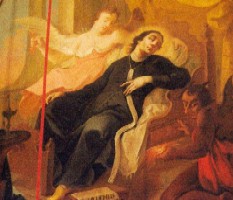William of Æbelholt
| Saint William of Æbelholt | |
|---|---|
 |
|
| Born | 1125 Paris, Kingdom of France |
| Died | 6 April, Easter Sunday, 1203 Kingdom of Denmark |
| Venerated in | Roman Catholic Church |
| Canonized | 1224 by Pope Honorius III |
| Feast | 6 April, formerly 16 June |
Saint William of Æbelholt (also known as William of the Paraclete, William of Eskilsø and William of Paris) (c. 1125 – Easter Sunday, 1203) was a French-born churchman of Denmark.
William was educated by his uncle Hugh, forty-second abbot of Saint-Germain-des-Prés at Paris, and, having been ordained subdeacon, received a prebend in the church of Sainte-Geneviève-du-Mont. William reportedly sought entry into a stricter house (either a Cluniac or a Cistercian monastery) while still in his youth, though he decided to remain at Ste-Geneviève. According to the hagiographic sources, his exemplary life did not commend him to his fellow canons, who tried to rid themselves of his presence, and even prevented by slander his ordination to the diaconate by the Bishop of Paris. William obtained this order from the Bishop of Senlis by his uncle's intercession, and was soon afterwards presented by the canons to the little priory of Épinay.
In 1148, by order of Pope Eugene III, the secular canons of Ste-Geneviève were replaced by canons regular from the Parisian monastery of St. Victor, whose prior, Odo, was made abbot of Ste-Geneviève. William soon afterwards joined the new community and was made sub-prior. In this position he showed great zeal for the religious life, and on one occasion opposed the entry of a new prior who had obtained his position irregularly. For this he was punished by Abbot Garin, successor of Odo, but his action was finally supported by Pope Alexander III. Such actions apparently put William at odds with his abbot, who subjected him to humiliating discipline, about which the canon complained bitterly to the pope.
...
Wikipedia
